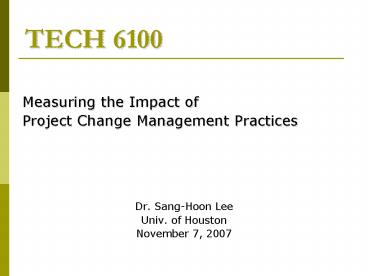TECH 6100 - PowerPoint PPT Presentation
1 / 15
Title:
TECH 6100
Description:
Construction Industry Institute (CII) Benchmarking and Metrics ... Model parsimony. Interpret the final significant coefficients statistically and technically ... – PowerPoint PPT presentation
Number of Views:50
Avg rating:3.0/5.0
Title: TECH 6100
1
TECH 6100
- Measuring the Impact of
- Project Change Management Practices
- Dr. Sang-Hoon Lee
- Univ. of Houston
- November 7, 2007
2
Background Available Literatures
- Construction Industry Institute (CII)
Benchmarking and Metrics (BMM) database with
over 1,200 actual construction projects - A series of BMM data reports published by CII
3
Research Motivations
- Do different types of projects utilize the CII
BMM project change management best practice
(PCMBP) elements to the same extent? (Part I) - Is there any difference between different types
of projects in terms of overall use of PCMBP?
(Part II) - The impact of PCMBP on Project Change Performance
(Part III) - - To promote wider and more extensive
implementation
4
CII BMM Database Demography
unknown
5
PCMBP Elements
6
PCMBP Elements (continued)
7
Research Methodology
Part I
Part II
Only available for version 7
8
Research Methodology
Part III
9
Methodology
- Data particularity statistical techniques
- Incompleteness -gt shrunk amount of available data
sets - Categorical independent variables with
heterogenic variances and non-linear relation
between the DV and IVs -gt OLS regressions,
cross-table correlation statistics, and canonical
correlations, etc. are unwarranted - Extreme uneven frequency distributions across
categories -gt MLE-based methods - Binary (v26) or ordinal (v7) dependent variables
(part I) -gt Binary (v26) or logistic (v7)
regression - Continuous (interval) dependent variable (part
II) -gt ANOVA - PCMBP and Project Change Performance -gt Linear
Regression - Statistical data analysis program SPSS 14.0
10
Methodology (Part I)
- Data preparation
- Transformation
- Truncation
- Recoding
- Assumption check (pre-hoc and post-hoc
detections) - Sample adequacy
- Multicollinearity (by standard errors)
- Outliers ( by standardized residuals )
- Model buildup theoretical bases
- Select significance level
- Select original independent variables
- Model verification and refinement
- Log likelihood ratio test
- Chi-square goodness of fit test
(Hosmer-Lemeshows test) - Nagelkerke R-square
- Model validation
- Cross-validation
- Model interpretation
- Model parsimony
11
Data analysis process (Part I)
Define original IVs (categorical nominal and
ordinal) and DV (binary)
Assert no significant main effect on the DV
Is there any significant variable?
No
Retain the model in last step
Test the null model with only constant
Yes
Is there any new outlier?
Drop non-significant variables
No
Are all model verification criteria met?
Recall the cases with complete data in left
variables
Yes
Yes
Delete the outliers
- Test the refined model
No
Refit the model
Are all model verification criteria met?
No
Accept the null model and assert no significant
relationship between DV and IVs
Interpret the final model
Yes
12
Data analysis results (Part I)
Version 26
Version 7
13
Data analysis (Part II)
- Multiple ANOVA vs. k-way ANOVA even cell size
vs. power of test - Significant findings
- Heavy industrial gt Buildings
- Light industrial gt Buildings
- (gt100MM) gt (lt5MM)
14
Data analysis (Part III)
- Multiple One-way ANOVA Regression
- Kolmogorov-Smirnov test to check data normality
- Significant findings
- Element 4, 5, 6, 10
- Regression Results
- Coefficient -0.017
- Significance 0.004
15
Conclusions
- Contractor projects and small/large projects are
more likely to use change element 1, compared
with owner projects and medium-size projects,
especially in design phase. - Grass root projects implement change element 10
more widely than add-on and modernization
projects do. - Generally, industrial project (heavy and light)
outperformed building projects in terms of
implementing change best practices. - Large-scale projects (gt100MM) implement the
project change management best practices more
than other scale projects do.































